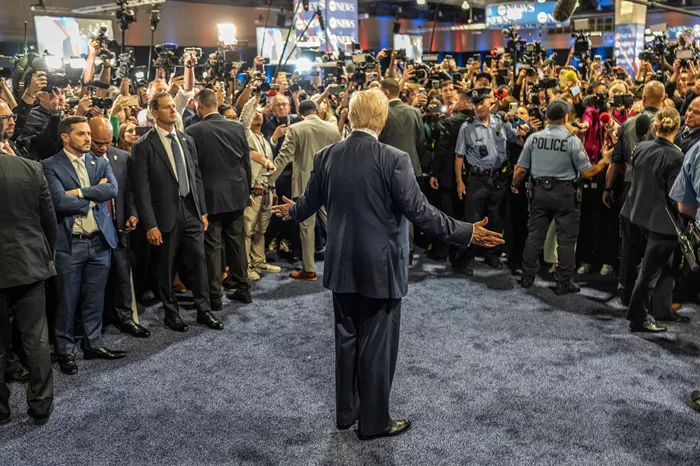Trump Doubles Down on Anti-Immigrant Rhetoric in Latest Debate.
Former President Donald J. Trump continued his pattern of inflaming fears about immigrants during Tuesday night’s debate with Vice President Kamala Harris. In a stark escalation, Trump promoted a discredited conspiracy theory claiming that Haitian immigrants were harming and eating American pets. This rhetoric underscores his persistent strategy of using immigration issues to galvanize his base and deflect attention from other policy matters.
Trump’s Persistent Anti-Immigrant Stance
Throughout the debate, Trump reiterated his focus on immigration as a key campaign issue. His first mention of “dangerous” migrants came less than a minute into his initial response, which was intended to address economic prospects. This emphasis on immigration reflects Trump’s broader political strategy of stoking public anger and offering scapegoats for various national concerns.
Harris Maintains Composure
Vice President Harris chose not to engage deeply with Trump’s provocative claims. Instead, she highlighted the significant reduction in illegal border crossings under the Biden administration. Measures such as Biden’s executive order from June, which imposed new asylum restrictions, have led to a notable drop in border arrests. July saw over 56,000 arrests, a significant decrease from the peak of around 250,000 in December.
Harris pointed out Trump’s role in undermining bipartisan efforts to enhance border security. She suggested that Trump’s extreme rhetoric reflects his tendency to embrace outlandish claims.
Debate Highlights and Disputed Claims
During the debate, when asked about his assertion that migrants were consuming pets, Trump cited unverified reports but offered no concrete evidence. Local officials have found no credible instances of such incidents involving Haitian immigrants. In response to Trump’s comments, Harris described his rhetoric as “extreme.”
Shifts in Democratic and Republican Approaches
Trump’s intensified anti-immigrant rhetoric contrasts with recent shifts within the Democratic Party. Following a significant migrant surge in 2022 and 2023, Democratic leaders like New York City Mayor Eric Adams voiced strong concerns about the impact of immigration on urban areas. These concerns have influenced President Biden and Harris to implement stricter border measures, paralleling some of Trump’s previous policies.
Trump’s current position involves advocating for mass deportations and describing American cities as being overwhelmed by an “invasion” of migrants. This rhetoric reflects a broader shift among both major parties towards more stringent immigration policies.
Political Strategy and Spending
As the 2024 presidential election approaches, immigration remains a contentious issue. Democrats are increasingly investing in advertisements to counter Trump’s narrative. According to data from AdImpact, Democratic spending on immigration-related ads surged to $24.6 million in August, up from $6.1 million in July. Despite this, Republican spending on similar ads remains substantially higher, reaching $106 million in August.
Beatriz Lopez of Immigration Hub noted that Democrats need to better leverage immigration as a political asset rather than a liability. This shift in strategy highlights the ongoing debate over immigration policy and its role in the upcoming election.
Conclusion
As the presidential election nears, immigration continues to be a focal point in political discourse. Trump’s provocative claims and aggressive stance on immigration contrast sharply with the Biden administration’s efforts to balance enforcement with legal immigration opportunities. The debate over immigration is likely to remain a pivotal issue in the lead-up to the election.


